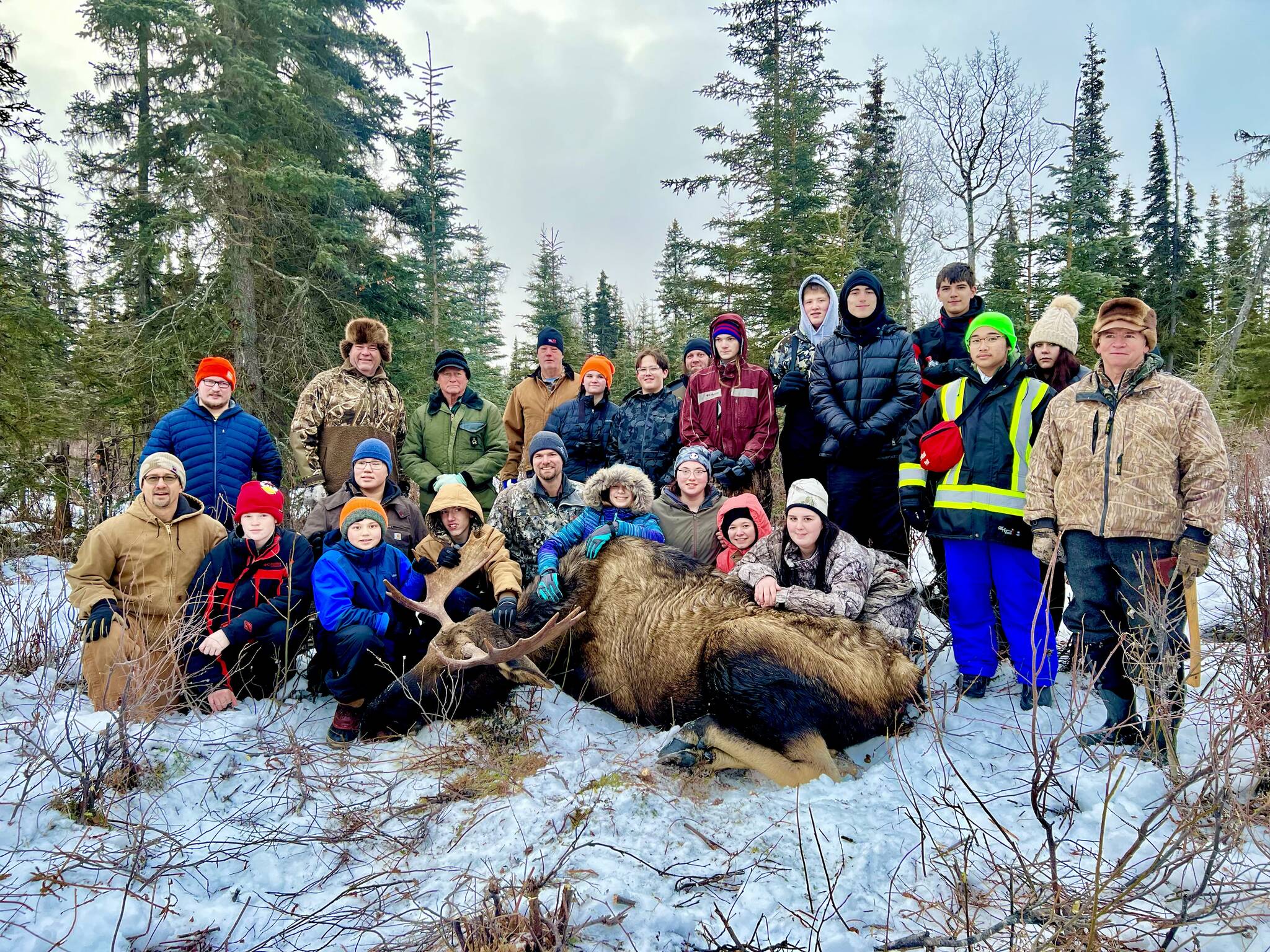Last week, a group of students from Nikiski Middle/High School and Kenai Middle School took part in an educational moose hunt, learning to ethically and responsibly harvest a moose and process its meat for food.
Students worked alongside instructors Jesse Bjorkman, Ken Felchle, and volunteers from the Kenai Peninsula Chapter of Safari Club International.
Bjorkman said Wednesday that he’s been leading the local hunt for “about 12 years,” since he and another Nikiski Middle/High teacher, Dylan Hooper, started an outdoor education program at the school. But he said the educational moose hunt started long before that, more than 30 years ago, as a project within the State Department of Fish and Game driven by people like Ted Spraker and Larry Lewis. As part of that program, the group is issued a special permit that Bjorkman said allowed them to harvest either a bull moose with antlers below a certain size or a cow moose without calves.
“It gives a lot of young people the opportunity to harvest a moose,” Spraker said Wednesday. “They learn a lot about conservation, firearm safety, hunter education — come away with some knowledge … it’s always been a real benefit.”
In Nikiski’s outdoor education class, Bjorkman said they teach the students “lifelong outdoor skills,” going through the department’s hunter education and training program, covering survival in cold weather and cold water, learning avalanche safety, navigating by stars and by compass, and recognizing plants and animals.
“If you can think of some kind of component to enjoying Alaska, outdoors, we teach it.”
The moose hunt is usually a “capstone” to that course, but this year looked a little different because of scheduling changes. Because the class wasn’t held this semester, the students weren’t able to spend time in the classroom preparing for the hunt, though Bjorkman said they were able to open the program up to more students.
Previously, Bjorkman and Spraker said they’d only seen a max of around a dozen students attend, but this year it was 17 students — including for the first time the students from Kenai Middle — who met early Saturday morning to hunt for a moose.
Spraker said it was “hard to fathom” sneaking up on a moose with so many people, “but it worked out.”
Bjorkman said its important every year to teach Kenai Peninsula students about the ecology and biology of the big game in their immediate surroundings. He said the students are learning about the local populations and their conservation while also learning to hunt and gather meat to support their families.
“The reason we do this is to expose kids to ethical hunting,” Spraker said.
Even though they didn’t have the class time to prepare, the instructors and volunteers talked to the students before and during the hunt about hunting as conservation and the significance of hunting and harvesting food while maintaining healthy stocks. Most of the students had never hunted before.
“They did an outstanding job at understanding the serious work, but also the solemn fun and the pride of ownership a person has in harvesting an animal,” Bjorkman said.
Students, teachers and parents, as well as Spraker, Mike Crawford, and Dennis LaRoche from the Safari Club, set out from Nikiski Middle/High on Saturday, Dec. 2. Spraker said they searched for a legal animal around the Escape Route.
The students were tasked with spotting the moose, and identifying whether they were both legal and responsible to shoot. That meant both recognizing the hunting regulations and also ensuring that no moose calves were around and that a clean shot could be made. Bjorkman said they successfully identified many that weren’t viable before finally coming across an animal that could be harvested. The group held back while Bjorkman approached and made one successful shot.
Again, the students were expected to do the work that came after themselves. Bjorkman and the other adults guided the students through the process of safely approaching a downed animal and then breaking it down into smaller pieces and returning it to the waiting cars.
They skinned and quartered the moose, removing all the edible meat. Later, the students took it to a shop and themselves turned the meat into food. Each student took home around 20 pounds.
Spraker said he was proud to see the students learn practically, and also to see them bring home the food they had produced with that labor.
“They’re involved in every aspect of it,” Spraker said. “It’s good education.”
With 17 students attending, Bjorkman said they were able to engage with the animal and the work to their comfort level. Some were excited to “jump right in,” while others watched closely without necessarily getting their hands on the animal.
It’s always exciting, he said, to see the students — both the boys and the girls — stepping up into leadership roles. He says they could be seen managing tasks, directing their peers, and ensuring all the work was done. Anytime a big game animal is harvested, “you have a lot of work to do.” The leadership exhibited by the students makes that work happen faster.
“It all worked out very well,” Bjorkman said. “That was a great day.”
Reach reporter Jake Dye at jacob.dye@peninsulaclarion.com.

